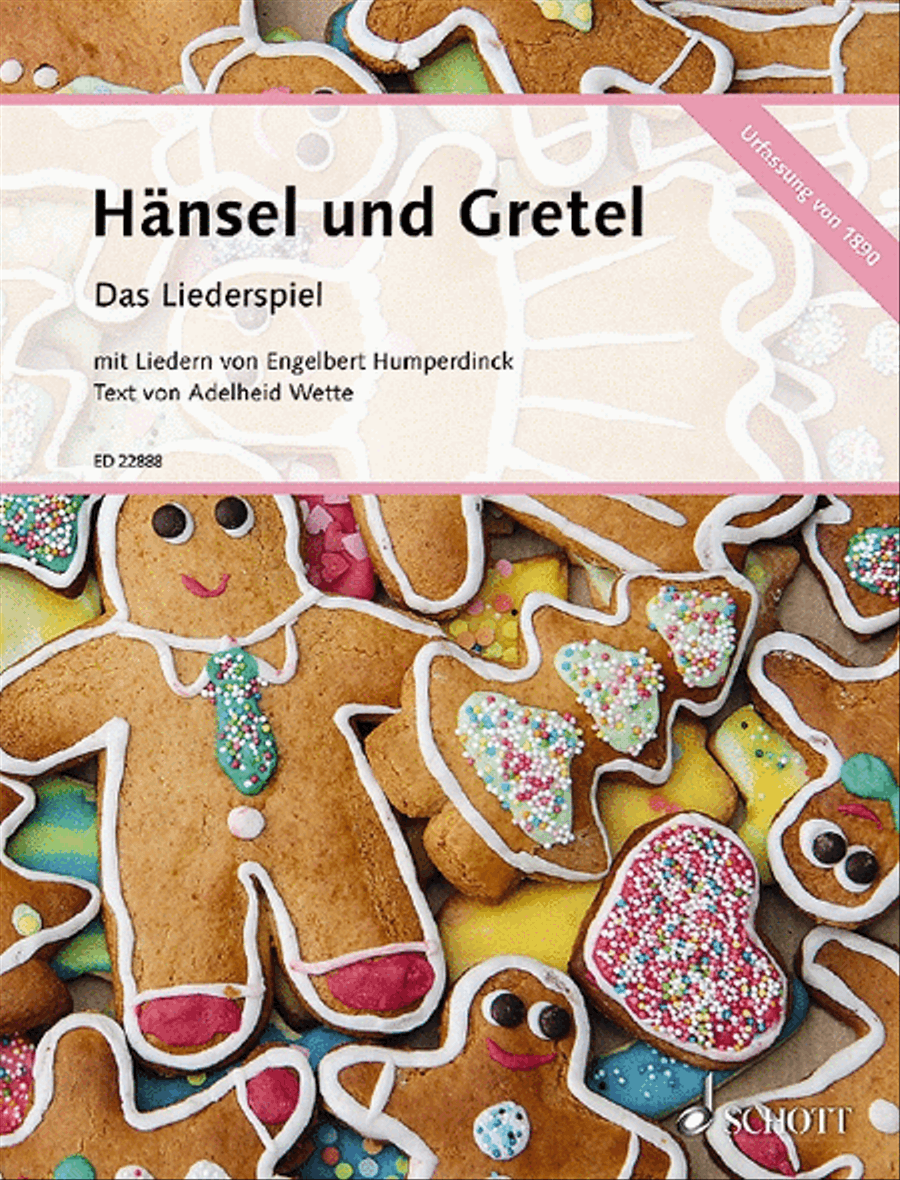2 voices and piano - intermediate - Digital Download SKU: S9.Q47807 Das Liederspiel. Composed by Engelbert Humperdinck. This edition: single sheet. Singspiel version - fairy tale - Brothers Grimm - folk song - piano reduction - Hansel - Gretel - witch. Downloadable, Separate edition. Duration 55 minutes. Schott Music - Digital #Q47807. Published by Schott Music - Digital (S9.Q47807). German.When Engelbert Humperdinckâs fairy tale opera Hänsel und Gretel was premiered on 23 December 1893 in Weimar conducted by Richard Strauss, the work could look back on an extensive history of origin.Humperdinckâs younger sister Adelheid Wette (born in 1858) had displayed a great interest in literature in her youth and written a variety of poems for special occasions. In 1888, she wrote a fairy tale entitled Schneewittchen [Snow White] and her brother supplied some songs for this piece. Further fairy tale collaborations followed which were customarily performed within the family circle, and the first draft of the Hänsel und Gretel was begun in 1890. Adelheidâs husband would be celebrating his 34th birthday on 16 May of this year and his wife intended to surprise him with a performance of her version of this fairy tale. Her brother was allotted the task of composing the accompanying songs and, a month before the birthday, she wrote a letter to him in Mainz where Engelbert Humperdinck was among other activities working as an editor for the Schott publishing house, ordering a âvery pretty folkloricâ Tanzlied [Dance song], a Waldlied [Forest song] (or Echolied [Echo song]), a Schlummerlied [Lullaby] and a Kickericki-Lied [Cock-a-doodle-doo song] from her âdear sugar-sweet little brother... Engel-Bärtchen [angel beard]â. She enclosed the corresponding verses with the letter and âfor funâ also provided her own invented melody for the Schlummerlied and rhythmic suggestions for the Tanzlied. Humperdinck went straight to work and, as related in an entry in his diary, was already able to play the songs to the director of the publishing house, Dr Ludwig Strecker, by 19 April.This was the history of origin of the four songs published for the first time edited in form of their original versions in this edition Brüderchen kommâ tanzâ mit mir, Wer ruft mir im Walde doch alles nach, In den Zweigen die Vögelein und Tirelireli! âs ist nicht mehr früh âfor two childrenâs voices and piano accompanimentâ (see manuscript1). In his reply letter to his sister in which the fair copy of the songs were enclosed, Humperdinck wrote: âAs you see, the pitch of the melodies is not too high and I have incorporated your melodies. Let me know soon whether you like the little songs. By the way, the âcock-a-doodle-dooâ can also be sung on one note(E flat) instead of on the four notes of the chord.âThe first performance of the song-play was held as planned within the family circle with Wettesâ two eldest daughters in the two principle roles. Spurred on by the success of the family performance, initial plans were forged to adapt the song-play into a singspiel with numerous musical numbers and rhymed dialogues; Hermann Wette participated in a draft of the text. The particell of this singspiel had been completed by Christmas 1890. Hugo Wolf and a few others however advised the composer to extend the singspiel into a through-composed fairy tale opera. Humperdinck followed this advice and worked on what he ironically termed as a âKinderstubenweihfestspielâ [sacred festive play for the nursery] during the next two summers in Bayreuth. Tanzliedchen [Dance song] and Morgenweckruf [Cock-a-doodle-doo song] were eventually included in the opera in a modified form.Bevor Engelbert Humperdincks Märchenoper Hänsel und Gretel zum Welterfolg wurde, hatte das Werk bereits eine vielschichtige Entstehungsgeschichte hinter sich. Humperdincks Schwester Adelheid Wette schrieb 1890 ein gereimtes Märchenspiel gleichen Namens, welches sie gemeinsam mit ihren Töchtern im Familienkreis aufführte. Ihr Bruder hatte die entsprechenden vier Lieder dazu beigesteuert. Während Brüderchen, komm tanz mit mir und Tirelireli in veränderter Form auch in die spätere Märchenoper eingingen, existieren das Schlummerliedchen und das Echo im Walde exklusiv in dieser Urfassung von Humperdincks Hänsel und Gretel. Diese Ausgabe umfasst Humperdincks vier ursprüngliche Lieder, die in dieser Fassung erstmals in editierter Form veröffentlicht werden, ebenso wie den vollständigen Text von Adelheid Wettes Liederspiel aus dem Jahr 1890.
